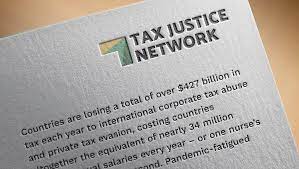
Michael Klein
Advocacy group Tax Justice Network has once again released a report that has been repeatedly criticised for its widespread errors and false assumptions.
The latest State of Tax Justice report has made no effort to correct any of the shortcomings of previous iterations.
Its claim that private and corporate cross-border tax abuse amount to $4.7 trillion over the next decade remains almost unchanged compared to two years ago.
At the time, Cayman Finance released a report on the extremely distorted estimates and other errors made by the Tax Justice Network assessment.
Cayman Finance’s own report – “TJN’s State of Tax Justice: A Critical Review” – evaluated the State of Tax Justice reports for 2020 and 2021.
Its author, economist Julian Morris, noted both “highly inaccurate estimates of corporate tax data as well as substantial errors in TJN’s reporting on the legal and regulatory environment in the Cayman Islands.”
All of the criticism highlighted by Cayman Finance still applies today.
TJN claims profit shifting by multinational companies causes tax losses of $301 billion worldwide each year, whereas wealthy individuals holding money in offshore bank accounts were responsible for another $171 billion in lost annual tax globally.
The methodology used to arrive at these figures makes erroneous assumptions and ignores any tax developments that have taken place over the past decade.
Worse, TJN maintains that none of the efforts by the Organization for Cooperation and Development (OECD) in terms of tax transparency, tax information exchange and eliminating harmful tax practices have had any effect whatsoever.
Recognising what has happened in the international tax space would force the campaign group to lower its estimates. Instead, it maintains its flawed methodology to repeat inflated tax loss claims.
Alleged wealth tax abuse
TJN’s estimate of $171 billion in individual taxes lost, for example, assumes $9.9 trillion are held in undisclosed offshore accounts.
There is no evidence that this $9.9 trillion figure, an estimate from 2018 by economist Gabriel Zucman, has been adjusted in any way to reflect tax reporting under the international Common Reporting Standard or the US Foreign Account Tax Compliance Act (FATCA).
Both tax reporting standards ensure that financial accounts held by taxpayers abroad are reported by foreign financial institutions to the taxpayers’ home tax authorities.
The OECD reported that information on EUR11 trillion (US$12 trillion) held in 111 million overseas accounts had been exchanged in this way between more than 100 countries in 2021. At the same time another $4 trillion has been reported to the US Internal Revenue Service under FATCA.
Cayman’s Department of International Tax Cooperation (DITC) is automatically exchanging tax information under the Common Reporting Standard (CRS) with up to 73 international partners around the world. In 2022 for example, the DITC transmitted financial account data on 550,000 Cayman accounts pursuant to CRS. Cayman equally participates in FATCA.
Simply disregarding the effect of tax transparency also means ignoring that the OECD assessed Cayman’s system for the automatic exchange of tax information in practice, giving the islands the highest possible rating.
Even though both systems, FATCA and CRS, arguably still have some flaws, assuming almost $10 trillion in undeclared offshore wealth is fanciful. TJN’s $171 billion tax loss estimate results from applying an estimated average top income tax rate to an assumed average 5% return on those offshore assets.
The report also asserts that 99.97% of bank deposits in Cayman and 50% of global bank deposits are “abnormal” on the basis that their volume is higher than what would be expected based on the size of the jurisdictions’ economies.
That is just absurd, particularly for the second largest fund domicile in the world. Essentially, it assumes that financial centres solely exist for tax abuse, describing them as secrecy jurisdictions, when they are not.
The analysis completely disregards the legitimate and beneficial role of international financial centres as financial intermediaries, in terms of facilitating financial transactions, investments and global trade.
Profit shifting
What TJN calls corporate tax abuse is based on aggregated country-by-country reporting data published by the OECD. But the group’s estimates are equally unreliable.
The methodology assumes what theoretical profit levels should be based on wages paid and the number of employees corporations have in each country.
It then compares the tax that should have been paid on these fabricated, theoretical profits to actual tax paid and describes the difference as misalignment.
To make matters worse it then equates the entirely made-up misalignment with corporate tax abuse.
Naturally, there is no tax system in the world that allocates profits and applies taxes in this way. To call TJN’s corporate tax abuse figures fantasy would be a euphemism.
Widespread criticism
Cayman Finance is not alone in its criticism of the quality of TJN’s “flagship report”.
Dan Neidle of Tax Policy Associates found that the report’s claims are false, noting that its corporate tax abuse calculations are fictitious and that “the disparity between what the methodology does, and what TJN claims it does, is indefensible”.
Richard Murphy, a co-founder of the organisation, who left TJN in disagreement, has criticised previous State of Tax Justice reports and concluded they were so riddled with false assumption that claims made by the advocacy group should be considered deeply unreliable.
He has repeated his criticism with regard to the latest version of the report, saying it ignores the effect of tax measures by the OECD, and erroneously assumes offshore deposits are illicit and not declared to tax authorities.
Murphy wrote, “TJN wants to pretend that the tax haven problem still exists on the scale that it once did because no one now at TJN now has any understanding of any other aspect of the tax justice debate, including the problems that exist within most domestic economies which is where most tax abuse now takes place, which fact they quite absurdly deny.”
He concluded, “the media should stop treating this report as credible when it clearly is not”.


